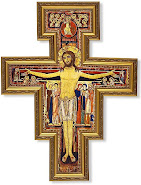Dr. Scott Hahn: 'Binding and Loosing'
Catholics are often asked tough questions about our Catholic faith and its relationship to the Bible. In his book, “Lord Have Mercy,” Dr. Scott Hahn “reveals the living, scriptural heart of the Church’s teachings on penance, forgiveness, and reconciliation.” I’ve provided the text below to present an understanding of the ancient Jewish priestly terms of ‘binding and loosing,’ and to show how Jesus, by transferring authority to the apostles, brings this old office into its fulfillment.
“. . It is a mark of the believer, then, to put faith in Christ’s power to forgive sins. Moreover, we must recognize He has chosen to exercise that power in a particular way. On the day He rose from the dead, Jesus appeared to His disciples and said to them, “Peace be with you. As the Father has sent Me, even so I send you.” Then He did something curious. He shared with them – the first priests of the New Covenant – His own life and His own power. “And when He had said this, He breathed on them, and said to them, “Receive the Holy Spirit. If you forgive the sins of any, they are forgiven; if you retain the sins of any, they are retained’” (Jn 20:22-23)
“. . It is a mark of the believer, then, to put faith in Christ’s power to forgive sins. Moreover, we must recognize He has chosen to exercise that power in a particular way. On the day He rose from the dead, Jesus appeared to His disciples and said to them, “Peace be with you. As the Father has sent Me, even so I send you.” Then He did something curious. He shared with them – the first priests of the New Covenant – His own life and His own power. “And when He had said this, He breathed on them, and said to them, “Receive the Holy Spirit. If you forgive the sins of any, they are forgiven; if you retain the sins of any, they are retained’” (Jn 20:22-23)
“He was establishing them as priests, to administer a sacrament, but also as judges, to pronounce judgment upon the actions of believers. He thus gave them a power exceeding what had formerly belonged to the priests of Israel. The rabbis referred to this ancient priestly power in terms of “binding and loosing,” and Jesus used those very words to describe what He was giving to His disciples. “Whatever you bind on earth shall be bound in heaven, and whatever you loose on earth shall be loosed in heaven” (Mt 18:18) For the rabbis, to bind or loose meant to judge someone to be in communion with the chosen people, or cut off form that group’s life and worship. According to the rabbis, the priests had the power to reconcile and to excommunicate. . . Before the apostles could exercise this power over souls, they would need to hear sins confessed aloud (or denounced publicly). Otherwise, they could not know what to ‘bind or loose.’”
[1] John 20: 22-23
[2] Matthew 18:18
[3] Dr. Scott Hahn. 'Lord Have Mercy' Published by Doubleday. Pg. 29-30










No comments:
Post a Comment